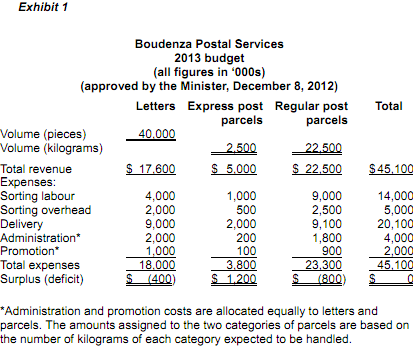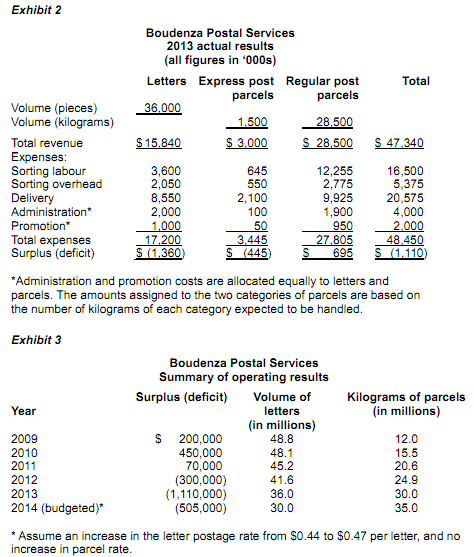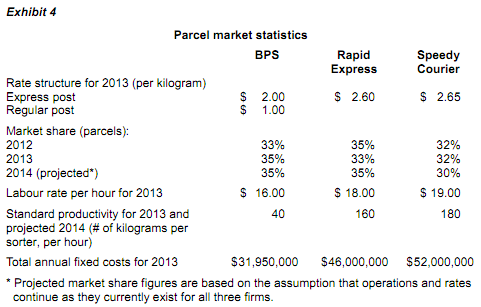Reference no: EM13168399
Question 1
The Boudenza Postal Service (BPS) was formed in 1870 with a mandate to establish a postal delivery system in Boudenza. The first postage stamp was issued in 1874. By 2013, BPS was handling more than 65 million pieces of mail per year.
Henri Plamondon has spent several years working with postal authorities in many countries. Recently, Plamondon was hired by BPS to assist in improving its operating and financial performance. The minister of general services, to which BPS management reports, is dissatisfied with the recent trend in financial results (Exhibits 1, 2 and 3).
Plamondon began his review by meeting with Robert Parsons, president of BPS, and Elizabeth Barton, operations manager.
PRESIDENT: From where I sit, the situation doesn't look very good. Our volume is fairly constant; however, the deficit keeps getting larger. We would like to break even in 2014 and earn a small surplus in 2015, but that is not going to happen unless we do something to turn things around. The basic mission of BPS is to provide effective and efficient postal services to the entire population and to interact with other postal authorities around the world. The vast distances, rugged terrain, natural obstacles and severe winter weather all contribute to making our job a great challenge. We calculate, for example, that in the month of March it costs us $2.20 to send a letter from a small town in our most easterly region to one of the northern outposts, but our revenue on that letter is still just $0.44.
PLAMONDON: Are there any segments that generate profit?
PRESIDENT: Parcel delivery is a potentially profitable segment; however, under our current mandate, letter delivery is not. Unfortunately, private carriers are encroaching on the parcel end of our business.
PLAMONDON: You said that the mission of BPS was to be effective and efficient. Which comes first?
PRESIDENT: Both, I guess. When a newspaper reports that it took fifteen days for a letter to travel ten miles, I get a call from the Minister to talk about effectiveness. In reality, 99.4 per cent of the mail is delivered on time. However, when the Treasury Board reports that BPS incurred a deficit of over a million dollars last year, the Minister wants to talk about efficiency despite the fact that postage rates have not increased in two years.
OPERATIONS MANAGER: Our productivity per sorting hour has been improving each year for the last decade, but costs keep increasing.
PLAMONDON: Can we discuss the cost structure in a little more detail? I imagine there are a lot of costs that you can't do too much about, at least in the short run.
OPERATIONS MANAGER: Exactly. The basic cost objectives at BPS are sorting, delivery, administration and promotion. Here's a copy of the budget for 2013 (Exhibit 1). All of the costs are fixed except for sorting labour which is strictly variable. In the past, we treated delivery as a variable expense too, but it didn't seem to change much over our normal range of operations.
You'll notice that we split the sorting costs into labour and overhead and separately keep track of both classes of parcels, express post and regular post. Both the standard and actual sorting labour rates were $16.00 per hour in 2013. Each letter sorter is expected to process a
standard of 160 letters per hour and each parcel sorter is expected to process a standard of 40 kilograms of parcels per hour regardless of what class they are.
In the administrative category, 85 percent of the costs are salaries and the rest are things like office supplies, phone charges and consulting fees. The management hierarchy has built up over the past twenty years. We've frozen the number of administrative positions in the organization for the last five years and that seems to have kept these costs under control. When I go on my quarterly office tour, everybody appears to be keeping themselves busy and we don't get many complaints from this side of the operation.
PLAMONDON: And what about revenues?
OPERATIONS MANAGER: Well, the rates throughout 2013 were $0.44 for the average letter, $2.00 per kilogram on express post parcels and $1.00 per kilogram for regular post parcels. So far, we've only been able to get approval for increasing the letter rate to $0.47 in 2014.
PRESIDENT: Things didn't go too well for BPS in 2013 (see Exhibit 2) and unless some changes are made, I don't see much future improvement. The outlook for the standard envelope is pretty bleak, but the Minister has refused our request to drop the letter delivery
business.
PLAMONDON: So the future is in parcels?
PRESIDENT: That's the way we're heading. The trouble is that our relationship with the parcel-sorters' union has never been very good. We've tried to introduce more automated machinery, but they fear the loss of jobs, members and bargaining power. I understand their position, but that doesn't change the fact that we're responsible for running this operation effectively and on budget. As I see it, we have four options:
1. Continue the parcel business as is, without changing the service or pricing structure.
2. Drop out of the parcel business altogether.
3. Subcontract the parcel sorting and delivery operations to the private sector.
4. Appeal to the Minister to alter the parcel pricing structure.



Each one of these options could be difficult to sell to the union, the public or the Minister. For instance, let's assume we decide to subcontract the parcel business. This could be very embarrassing for the government. On the other hand, the national communications and
petroleum industries were recently privatized without any adverse political repercussions.
OPERATIONS MANAGER: Whatever we decide to do, I project that the sorting labour rate will increase by 10 per cent next year and, if we stay in the parcel business, fixed costs will increase by 5per cent over what we incurred in 2013. I don't think we met our productivity standards last year, but I feel we can in 2014. If we drop parcels altogether, all of the direct costs (labour, overhead and delivery) of the parcel operation could be saved. In addition, overall administrative costs and promotional expenditures would decrease by $1,200,000 and $600,000 respectively in 2014 compared with the expected 2014 costs if we stay in the parcel business.
PRESIDENT: Subcontracting could easily be sold politically on the promise of better services and greater flexibility. The real difficulty would be the union.
PLAMONDON: Given their power, is it even worthwhile pursuing this option further?
PRESIDENT: Our analysis of one of the private sector operators, Rapid Express (RE), indicates that there might be some hope. RE pays its parcel sorters and handlers $18.00 per hour. Our union has always argued that BPS should match this figure, but the fact is that RE has highly automated sorting plants which process parcels at the rate of 160 kilograms per sorter per hour. The problem is that we currently employ about 400 parcel sorters and RE says it could only find jobs for about 100 of them. The union would surely make the loss of jobs their main protest. We would have to give those that aren't hired by RE substantial severance allowances equal to six months' salary. If we couldn't pay for this severance package out of the 2014 surplus, we'd have to ask the Minister to pay for it out of his discretionary funds. My guess is that the government would gladly cover any deficiency if we could promise profitable operations in the future.
PLAMONDON: Why don't you automate your sorting plants as RE has?
OPERATIONS MANAGER: We've looked into that but it's just too expensive. The government has refused to allocate any additional funds for automated machinery until we improve our efficiency, and it's hard to be efficient when we're stuck with a lot of manual sorting equipment.
PLAMONDON: The government's stand on automation seems to rule out one way of improving profitability. I wonder if the government is trying to force you to subcontract the parcel business as part of its privatization program. In any case, exactly how would this subcontracting option work?
OPERATIONS MANAGER: If we subcontracted to RE, we would eliminate the distinction between express post and regular post service. Parcels would still be accepted at the local post offices, but RE would pick them up, sort them and deliver them throughout Boudenza. RE would pay us a 12per cent commission based on parcel revenue generated by BPS. If we went with RE, the parcel rate would be $2.50 per kilogram. Going this route would probably increase our volume of business to 37 million kilograms in 2014.
PLAMONDON: Do you really think that the volume will reach 37 million kilograms and won't this have an impact on some of your other costs?
OPERATIONS MANAGER: Administration costs (which include general operating costs of the local post offices) would stay at their planned levels for 2014 (that is, a 5per cent increase over actual costs for 2013). If subcontracting occurs, we would save all direct costs of the parcel operation and increase our advertising budget by $2 million per year to promote this new service. One of the main selling points we would communicate to the public is guaranteed next day delivery anywhere in Boudenza. With that guarantee, we believe that the 37 million
kilogram target is definitely attainable.
PRESIDENT: The last option I'd like you to consider is altering parcel pricing so that our entire postal operations will at least breakeven in 2014. If we go to the Minister and ask for a change, our analysis will have to be thorough. I've put together some figures on the parcel market to give you an understanding of where we sit with respect to our competitors (Exhibit 4). Please note that we are obliged to keep the express-post rate per kilogram at twice the regular-post rate per kilogram.
OPERATIONS MANAGER: If we do alter our parcel prices, I think it would be wise to set new rates for parcels so that if volume slips, we will still manage to breakeven at 25 million kilograms in 2014. This way, we can help avoid a deficit for a third year in a row. Since the bulk of our parcel business is regular post, and as long as the express-post rate is double the regular-post rate, I expect that the projected parcel volume of 35 million kilograms for 2014 will be unaffected by the price increase. I also expect that the sales mix between kilograms of express post and regular post parcels will be the same as the mix we actually experienced in 2013.
PRESIDENT: Well, I guess that is about all for today. We have lots of things to attend to. I hope that you will be able to give us some advice on what we should be doing.
PLAMONDON: Thank you for your guidance and assistance. I'll begin my analysis immediately and report back as soon as possible.
Required:
Assume the role of Henri Plamondon and prepare a report to Mr. Robert Parsons, President of BPS. The report should analyze BPS's current operations and provide advice for the future on the following:
1. Analyze 2013 operations (including a variance analysis in as much detail as the data permit) to determine the causes of the loss.
2. Analyze the president's four options concerning the parcel business and comment on the strengths and weaknesses of each option.
3. Draw up a proposal for a new rate structure for the parcel business.
4. Make any other pertinent observations which would be of assistance to the management planning and control systems of BPS.